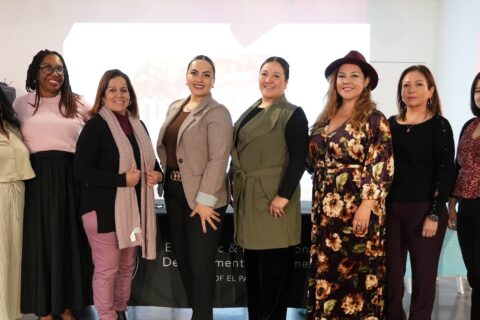In the ongoing pursuit of economic equity and inclusion, cities across the nation are increasingly turning to inclusive procurement practices as a powerful tool for fostering diversity and expanding access to opportunities for underrepresented businesses. Recently, the National League of Cities’ (NLC), through its Southern Cities Economic Inclusion (SCEI) initiative, conducted a peer-to-peer city site visit in Tallahassee, Florida, to gain insights into the city’s exemplary work focused on inclusive procurement. Hosted by the Tallahassee Leon County Office of Economic Vitality, this exchange of knowledge and experience proved invaluable for other city teams participating in the SCEI initiative that are also committed to implementing inclusive procurement strategies. Participating cities included Knoxville, Tennessee; Chattanooga, Tennessee; New Orleans, Louisiana; and St. Petersburg, Florida.
This SCEI Inclusive Procurement group is a subset of cities participating in the broader initiative focused on fostering economic inclusion in cities across the Southern United States. SCEI is supported by the W.K. Kellogg Foundation and the Annie E Casey Foundation and is in partnership with the Federal Reserve Bank of Atlanta. The subgroup consists of teams from five cities dedicated to advancing equitable procurement practices to support minority-owned and women-owned businesses. Their visit to Tallahassee represents a significant effort to learn from successful models and collaborate with peers to enhance their own strategies.
The visit also included a panel discussion comprised of experts from NLC, PolicyLink, Harvard Kennedy School’s Procurement Excellence Network, and the City of Lauderhill, Florida, which offered innovative ideas for advancing inclusive procurement efforts.
Throughout the visit, participants emphasized the importance of developing and implementing procurement policies that prioritize diversity, equity, and inclusion objectives. By setting clear goals for diversity and inclusion, municipalities can create a framework that fosters equitable opportunities for all suppliers, especially those from marginalized backgrounds.

Key insights and strategies shared during the visit include:
1. Leveraging Community Partnerships
The City of Knoxville is setting an example by expanding its efforts to leverage community partners. Collaborating with local organizations can enhance outreach efforts, provide valuable resources, and foster a supportive ecosystem for minority-owned and women-owned businesses. Building stronger alignment with governmental agencies, industry associations, and advocacy groups is a priority for many cities. These partnerships are crucial for expanding the reach and impact of inclusive procurement initiatives and fostering a shared commitment to economic inclusion.
2. Commitment to Targeted Outreach
Both the City of Knoxville and the City of Chattanooga are tailoring outreach strategies to target underrepresented businesses, thereby ensuring that procurement opportunities reach those who need them most. The City of Chattanooga is working to reduce the financial and educational barriers related to licensing requirements to build capacity for individuals from minority communities aspiring to become general contractors. The program offers comprehensive training, financial counseling, access to necessary capital, and a suite of tools for business management, helping to create a diverse new pipeline of skilled minority contractors equipped to enhance the local economy and foster community development.

3. Meeting Minority-Owned and Women-Owned Business Goals
The City of New Orleans is committed to increasing the capacity of minority-owned businesses by collaborating with technical assistance providers to host a series of business development workshops and DBE certification events. Setting and achieving these goals is essential for driving progress towards economic equity and ensuring that inclusive procurement efforts deliver tangible outcomes for underrepresented businesses.
4. Understanding Specific Issues/Needs of Small Businesses
The City of St. Petersburg conducted focus groups and surveys to provide valuable insights into the specific challenges and needs of small businesses. This information is crucial for developing targeted solutions and ensuring that inclusive procurement efforts are responsive to the realities faced by local entrepreneurs. By understanding local needs and challenges, cities can develop inclusive procurement strategies that address the unique socio-economic landscape of their communities and are effective and sustainable in the long term.
These insights, coupled with exchanges facilitated by NLC, underscore the importance of collaborative learning and sharing best practices in advancing inclusive procurement agendas. By embracing these lessons and committing to equity-driven strategies, cities can pave the way for inclusive economic growth and prosperity for all residents.
Additional Resources
- NLC | Narrowing the Racial Wealth Divide: Using Procurement to Support Minority- and Women-Owned Business Enterprises
- NLC | Inclusive Procurement and Contracting
- Procurement Excellence Network | How-to Guide: Using Government Procurement to Advance Racial Equity
- PolicyLink | Inclusive Procurement And Contracting: Building a Field of Policy and Practice










